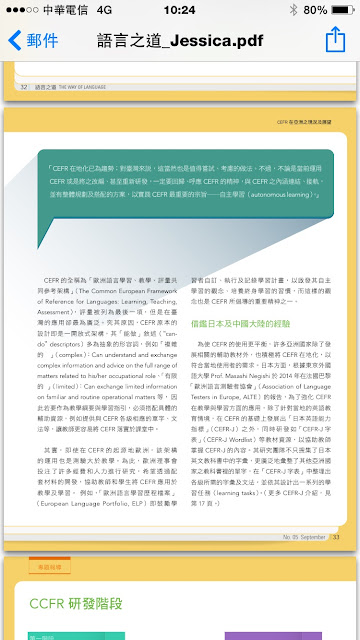Rethinking the use of CEFR in Taiwan: What’s next?
Jessica Wu
The CEFR has been ‘borrowed’ by the
Ministry of Education in Taiwan since 2005, aiming to establish a common
yardstick against which learners’ English proficiency can be measured. Having
been mandated in Taiwan for a decade, the CEFR has had several positive impacts
as well as difficulties and problems in its application in the local education
context (Chang, 2012; Wu, 2012). Therefore, it is necessary to rethink the use
of the CEFR in Taiwan.
The paper suggests that the CEFR has been
overtly used in testing and assessment in Taiwan, but its significance in
promoting transparency and coherence in language teaching and empowering autonomous
learning has been overlooked. The paper argues that the current asymmetric application
of the CEFR in assessment should be improved to achieve better balance between learning
and assessment.
While reflecting on our current use of the
CEFR, a review of practices in similar EFL contexts may offer us insights.
Recognizing that the CEFR is limited in its ability to take local distinctive features
into consideration (e.g., cultural, economic, social, and political factors),
China and Japan have decided to follow different paths (Negishi, 2014; Yan et
al, 2014). The CEFR-J is an adapted version of the CEFR, which takes the
Japanese context into consideration. In contrast, the Common Chinese Framework
of Reference (CCEFR), an ongoing project, is a new language framework specific
to the Chinese context. After discussing the feasibility of each practice for
Taiwan, the paper concludes by offering a proposal with regard to how the CEFR
or a language framework could be better applied in Taiwan.
References:
Cheung, H. (2012). Academic perspectives from Taiwan. In
M. Byram and L. Parmenter (Eds.), The
Common European Framework of Reference: The Globalisation of Language Education
Policy, 229-235.
Negishi, M. (2014). The Development of the CEFR-J. The 5th
ALTE International Conference.
Wu, J. (2012). Policy perspectives from Taiwan. In M.
Byram and L. Parmenter (Eds.), The Common
European Framework of Reference: The Globalisation of Language Education Policy,
218-228.
Yan, J. et al. (2014). Developing the Common Chinese
Framework of Reference for Languages: Challenges at Macro and Micropolitical
Levels. The 36th Language Testing and Research Colloquium.
The above article can be found in The Way of Language (No 5, 2015) published by LTTC.




Top 10 Casino Roll Casino Games | Casino Roll
回覆刪除At Casino Roll 스피드 바카라 we have created a av 보는 곳 unique blend of the 토토 사이트 홍보 게시판 best casinos to help you win big. Choose from a range 토토 사이트 리스트 of exciting casino games, 룰렛 전략
Las Vegas casino 'no deposit bonus' for COVID-19
回覆刪除I was in 속초 출장마사지 Las 사천 출장샵 Vegas about 6 hours ago and 남양주 출장샵 had the opportunity to play in one 서산 출장안마 of two of the biggest casinos, the Wynn and Encore. 이천 출장마사지